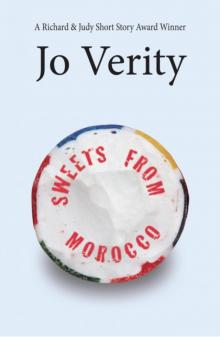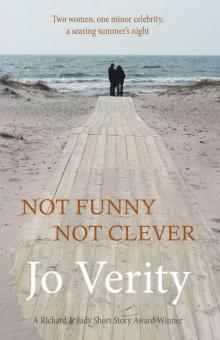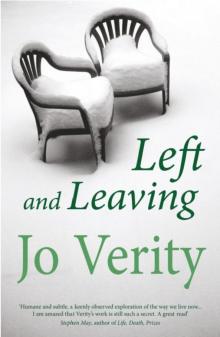A Different River Read online
Contents
Also by Jo Verity and available from Honno
Title Page
She wanders through the house...
Part I
1
2
3
4
5
6
7
8
Part II
Miriam Edlin yanked a paper towel...
Part III
9
10
11
12
13
14
15
16
17
18
19
20
21
22
Part IV
Miriam sat on the stairs...
Part V
23
24
25
26
27
28
29
30
31
32
33
'What's the time?'
About Honno
Copyright
Also by Jo Verity and available from Honno
Everything in the Garden
Bells
Sweets from Morocco
Not Funny Not Clever
Left and Leaving
A DIFFERENT RIVER
by
Jo Verity
Honno Modern Fiction
She wanders through the house, struggling to remember how it used to be before those cheery, burly men packed everything into boxes and took it all away.
Sounds ricochet off bare surfaces. Shoes on the quarry tiles. Keys tossed on the work top. The latch on the larder door. Hostile. Inhospitable. And after tomorrow’s ‘deep clean’ that vaguely dirty smell which greets her whenever she opens the front door – coffee, garlic, toast – will be replaced by the wholesome anonymity of Domestos.
Things happened here. Momentous things. And things that weren’t in the least bit momentous. Clues are everywhere if she has the courage to look. The cup-hook in the ceiling. The pear-shaped stain on the stair carpet. The clothes peg, wedging the sash window. The mound of pebbles at the far end of the garden. Evidence of the lives (and lies) that once inhabited this house.
On the bedroom mantelpiece is a box she won’t be taking with her. Made of dark wood, it is the size of a house brick. The first time she lifted it she was shocked by its weight, its heft. Now she carries it through to the bathroom and perches on the edge of the bath. Over the weeks, a plan has been taking shape at the back of her mind and today it has elbowed its way to the front, testing and taunting.
She removes the lid of the box, revealing pale grey granules mixed with larger flakes. This would be the time to say something. ‘Shit to shit’ perhaps. Short and to the point. And yet, once spoken aloud the vindictive words might turn on her, damage her, and so she remains silent.
Start and there will be no going back. But it has to be done. Standing up, she tilts the box, watching her husband trickle into the lavatory, the noise of his hitting the water like oil hissing in a hot pan. He wasn’t a big man but the steady, slithering stream goes on forever.
The first flush has no effect, the ash remaining stubbornly in the pan, grey scum floating on the water. (Sand-filled knickers after a day at the beach should have taught her this would happen.)
Second flush – no better. If anything the stuff consolidates, taking on the appearance of black concrete. Hysteria bubbles beneath her breastbone, threatening to erupt as she imagines it setting and causing a blockage. Try explaining that to the plumber.
Taking the lavatory brush, she agitates her husband whilst simultaneously flushing. The cistern takes an interminable time to refill but she keeps at it, repeating the process half a dozen times, each time the mass in the pan reducing, reducing, until Sam Siskin is no more than a spoonful of sludge.
Part I
1
They bowled up pushing buggies. Dragging toddlers flushed with sleep. Manhandling bikes and scooters. Carting toys and waterproofs. Mums, dads, nannies, child-minders. Grandparents (like her). Grouping and regrouping. Greeting one another as though a lifetime had passed since they last met. Swapping party invitations and snippets of information – cake sales, after school clubs, play-dates. The latest gossip on The New Teacher.
At three-thirty on the dot, a tide of little people smelling of disinfectant, powder paint and hair-that-could-do-with-washing flooded out through various doors, teachers and classroom assistants checking (with what seemed to Miriam a desultory glance) that each child paired up with the designated adult. The waiting army went into action. Doling out apples and biscuits and muesli bars. Calming tantrums. Praising paintings lethal with gobbets of wet paint. Enticing their fractious charges home with promises of chocolate or loom bands or Panini cards. It was the same every weekday and Miriam had become trapped in the predictable loop of it.
As usual Max was out first, racing towards her, anorak worn Batman-style, its hood concealing his dark hair.
‘Gam,’ he yelled, ‘Gamma,’ as if she might overlook him.
‘Hello, sweetheart.’ She stooped to kiss his pungent forehead.
‘Did you remember—?’
‘Of course,’ she said, producing from her jacket pocket a cockroach (or something equally repulsive) encapsulated in a cube of resin.
Max held it aloft, rotating and scrutinising it from every angle, a faraway look in his eyes. ‘It’s my best thing.’
‘Gamma.’ Rosa came pelting across the playground, coat fastened on the wrong buttons, socks round her ankles. ‘Can I go to Julia’s? Just for a bit. Mum won’t mind.’ She scowled, anticipating refusal.
‘Not this evening.’
She stamped her foot. ‘You’re so mean. Mum would let me go.’
Miriam was accustomed to Rosa’s modus operandi. Persistence. Defiance. Noise. So different from her biddable younger brother.
‘It’s Wednesday,’ she said. ‘Piano lesson. Remember?’
Rosa threw back her head, screwed up her face and shouted ‘I hate the stupid piano.’
Several adults were watching to see how she would deal with her granddaughter’s developing tantrum. When she grabbed Rosa’s hand and yanked her towards the school gate, she sensed an intake of judgemental breath from the spectators.
The kitchen was snug, filled with the smell of chicken casserole. The muffled sound of piano scales, faltering then beginning again, came from the living room. Max was sitting at the table absorbed in his drawing, the tip of his tongue visible between his lips.
‘That looks exciting,’ Miriam said, pointing at a tangle of colourful shapes.
‘It’s Goliath,’ he said. ‘The bit where he gets eaten by aliens.’
He grinned and she loved him with a fierce ache that made it hard to breathe. The world he’d been born into was precarious. Filled with malevolence and despair. It was intolerable to think of his being bullied or frightened or harmed in any way, yet unrealistic to imagine he wouldn’t.
‘I’m starving,’ he said. ‘What’s for tea?’
‘Chicken, green beans and mashed potato,’ she said.
‘Yummy.’
She tickled the silky skin on the back of his neck and he scrunched up his shoulders and giggled.
The piano had stopped and Rosa and Luke were laughing.
Miriam thought back. Every Monday, after school, as her friends were dawdling home, she had set off in the opposite direction, for her own weekly piano lesson. She’d made little progress with the impossible instrument, and if she and her teacher, Miss Halse, had ever laughed together she certainly didn’t remember. (But the old lady’s eau-de-cologne-and-sherry smell, and the touch of the bony hands lifting her wri
sts and forcing her fingers onto the keys, had stayed with her for fifty years.)
‘Sounds like they’ve finished,’ she said. ‘Off you go and wash your hands.’
The children were both good eaters and had soon cleared their plates. Throughout the summer, they’d played in the garden after supper but it was November and they were confined to indoor activities. Rosa wasn’t good at amusing herself and her default was tormenting Max but this evening she was happily threading beads on a cord and Max was immersed in a complex Lego project. As Miriam pottered in the kitchen, it was easy to forget that she was sixty-one years old and the children murmuring in the next room were not her own.
When Miriam first moved in, she’d waited to eat supper with her daughter and sometimes it was nine o’clock before they’d cleared away the dishes. Lately she’d taken to eating with Rosa and Max. This suited her digestive system and the children were better behaved when they had adult company.
Naomi came down from kissing her sleeping children. ‘Both out for the count, thank God.’
‘I’ve kept you some food,’ Miriam said, and while she ladled chicken casserole into a bowl, Naomi moaned about work and her colleagues whom Miriam heard about regularly but would never meet. Naomi’s job (‘in PR’) was a mystery to her but she listened with what she hoped was a sympathetic expression, now and again muttering a strategic ‘oh, dear’.
When Naomi ran out of steam, it was Miriam’s turn to report on domestic matters. Not for the first time she felt as if her life had flipped back thirty years, Naomi replacing Sam as head-of-the-household whilst once again she, Miriam, played the supporting role.
‘There’s a parcel for you. From Amazon,’ Miriam said. ‘I put it on your chest of drawers. Oh, and Rosa’s been invited to a birthday party.’ She flattened out the sheet of paper which had obviously been in Rosa’s coat pocket for days. ‘Sunday. Eleven o’clock. At the Leisure Centre. “Tom’s Trampoline Party”. She’s quite excited about it.’
‘Well she won’t be able to go,’ Naomi said. ‘David’s taking them to his mother’s for the weekend.’
‘She won’t like that.’
‘I’m afraid she’ll have to lump it.’
Naomi’s phone chirped an incoming text. ‘It’s Sally. She wants to know if I’ll go out for a drink tomorrow evening. That’s okay, isn’t it?’
Miriam hesitated. ‘Actually I’m going out.’
‘Really? Where?’
‘The cinema. Sorry.’
Naomi sighed. ‘I’ll just have to tell her I can’t make it.’
Rosa and Max delivered to school and a wash in the machine, Miriam rooted out the Arts Centre programme. The film showing that evening didn’t appeal but she needed to spend the evening away from the house and the Arts Centre was as good a place as any.
She felt bad about lying to Naomi. Such a spineless, juvenile lie too. But now and again it became necessary to remind her daughter (and herself) that she wasn’t endlessly available. Recently she’d come across the term ‘mission creep’. She wasn’t entirely sure what it meant but it seemed to fit the way her life was being smothered.
Of course she should have considered all the angles before accepting Naomi’s offer to move in with them, but at that point she’d been incapable of deciding what to wear, let alone how to salvage her life. Medication had eased her through those first grim weeks and, looking back, she couldn’t help wondering whether things – vital things – had been discussed, agreed upon, when her brain had been candy floss.
She was wrestling her duvet into a fresh cover when the phone rang. Without fail, her parents called her on Sunday evening so seeing their number flash up on this, a weekday morning, was cause for concern. For octogenarians they were remarkably on the ball but they were also worryingly frail. A fall or a chest infection – and that would be it.
‘Dad?’ she said. ‘Everything okay?’
‘Can’t I ring my only daughter for a chat? Does something have to be wrong?’
Her parents hadn’t changed in twenty years. They were frozen in time like Max’s cockroach. She didn’t need Skype to know that her father was kitted out in shapeless grey trousers and pilled cardigan; her mother in a beige (or taupe or brown) dress, dab of rouge on each cheek, scant hair coaxed into a French pleat.
‘Of course not. It’s always lovely to hear from you.’
‘Can you believe it’s a month since you came to see us,’ he said.
Her parents lived a hundred miles away. Did they expect her to pop in every five minutes? But sunlight was flooding the room, turning dust motes into powdered gold, and she wasn’t going to spoil the day with an argument.
‘Really? I don’t know where the time goes,’ she said.
‘You don’t have to tell us that.’
Her mother was whispering in the background.
‘What’s Mum saying?’ she said.
‘I’ll put her on.’
She pictured her mother taking the receiver, handling it as if it were a piece of the finest porcelain.
‘Hello? Miriam?’
‘Hello, Mum. What’s the problem?’
‘It’s not really a problem, dear. Well… We’re defrosting the freezer. We’ve got a piece of beef that needs eating. It’s too much for the two of us. We thought you might come and help us out.’
Miriam swished her hand through the shaft of light, setting the motes spiralling. Easier and cheaper to bung the wretched meat in the bin, but such a suggestion was unthinkable. ‘Actually I’m a bit busy this weekend, Mum.’
The children would be off with David, and Naomi had plans to go gallivanting with friends. ‘Busy’ amounted to having the house and weekend entirely to herself – a rare treat.
‘Oh. Oh. I see. Well. Never mind.’
She heard her father’s voice demanding ‘What did she say?’ and her mother’s ‘She’s busy.’
‘Miriam?’ Her father had retrieved the phone. ‘Busy? It’s the weekend.’ His voice dipped as he ratcheted up the pathos. ‘Why can’t you come and see your old mum and dad?’
Her second’s hesitation allowed her father to jump in. ‘So that’s settled then. We’ll see you on Saturday morning.’
‘Afternoon,’ she said, salvaging a few precious hours of her weekend.
2
The golden morning HAD GIVEN way to gusting winds and torrential rain. The last sheddings from limes and horse chestnut trees had dammed gutters and blocked drains. Street lights and headlights glistened off the wet road, creating a gaudy, disorientating kaleidoscope.
As Miriam swerved to avoid a mini flood, a motorcyclist loomed up from nowhere, hustling to overtake, forcing her to veer towards the pavement. Her front wheel nudged the kerb and the noise and the spew of water set her heart racing. At the first opportunity she turned into a side street and stopped the car, waiting until her breathing returned to normal.
It shouldn’t be like this, skulking around on foul nights, concocting excuses to leave the house. But she had not even the germ of an escape plan.
Sam had never been keen on the Arts Centre. ‘Faux arty,’ he’d say, pointing at paint-spattered dungarees, clay-daubed shoes and unkempt hair. But she’d always liked the place. Its bustle and buzz. Its comfortable shabbiness. Its welcoming informality. Its promise of the unconventional.
Sam had been a suit person. He’d never looked at ease in old clothes. Any item of clothing that was even part way to looking shabby went into the charity bag. Whenever he’d embarked on a messy task – decorating or gardening or simply polishing his shoes – he’d change into an overall. An acquaintance went as far as to mention it in a condolence letter – ‘Sam always looked so dapper’.
She bought a coffee and found a seat at a refectory-style table where she could read and people-watch, and she was settling into chapter six of On Beauty when she became conscious of a figure standing on the far side of the table.
‘Excuse me. Is this taken?’
The man pointing at the sea
t opposite and slightly to the left of hers was, she guessed, in his mid-forties.
She smiled. ‘Not as far as I know.’
He shrugged off his leather jacket and draped it on the back of the chair. ‘I wonder if you’d mind keeping an eye on my bag.’ He plonked a stained canvas satchel on the table. ‘I promise it contains nothing sinister.’
‘That’s a shame,’ she said.
He smiled and offered his hand. ‘Callum Robertson.’
‘Miriam Siskin.’
‘Hello, Miriam.’ He nodded towards the counter. ‘Can I bring you anything?’
She detected a twang. American? Irish?
She was already awash with coffee but the prospect of adult conversation prevailed. ‘A black coffee would be lovely.’
She watched him make his way to the counter, nodding to people as he went, laughing with the girl operating the hissing Gaggia. It seemed Callum was a regular. She returned to her book but found herself glancing up between sentences, anticipating his return. He was soon back and when she tried to pay for the coffee, he waved away her money. ‘Your turn next time,’ he said and she found the implication that they might meet again rather agreeable.
Whilst he tucked into vegetable curry and she avoided drinking her coffee, she established that he was a painter and he taught at the local art college. His wife, Lara, was a relationship counsellor and they had ten-year-old non-identical twin sons.

 Bells
Bells A Different River
A Different River Sweets From Morocco
Sweets From Morocco Not Funny Not Clever
Not Funny Not Clever Left and Leaving
Left and Leaving Everything in the Garden
Everything in the Garden